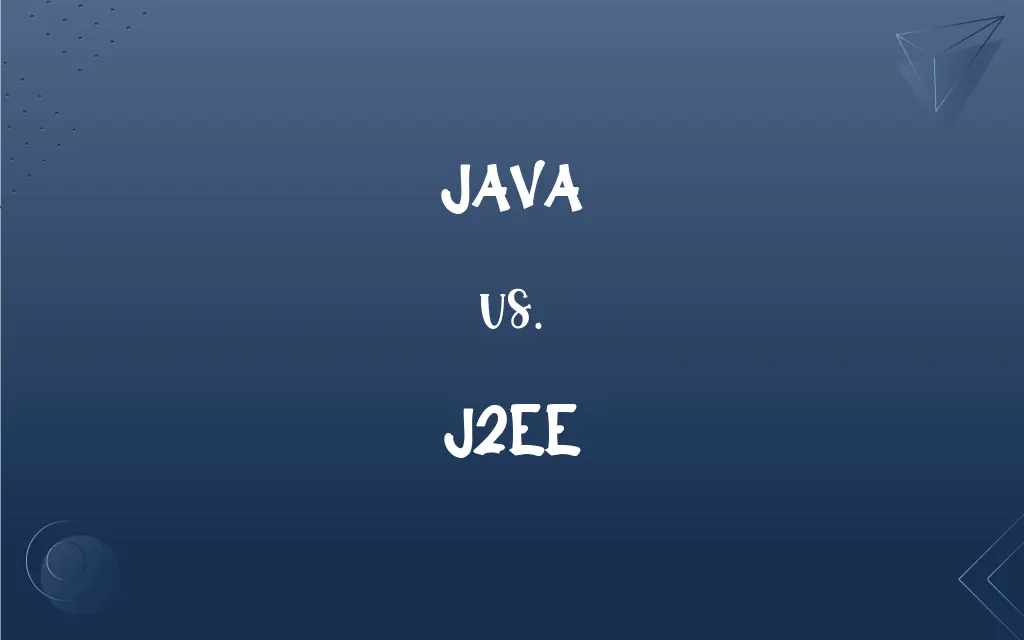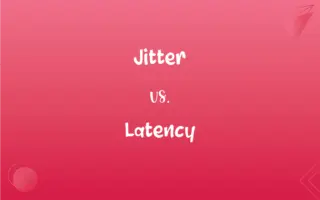JAVA vs. J2EE: What's the Difference?
Edited by Aimie Carlson || By Janet White || Published on February 3, 2024
JAVA is a programming language used for a wide range of applications, while J2EE (Java 2 Platform, Enterprise Edition) is a platform for building server-side applications using JAVA.

Key Differences
JAVA is a versatile, object-oriented programming language used for developing a wide range of applications, from mobile apps to web services. J2EE, on the other hand, is a platform built on JAVA, specifically designed for developing enterprise-level applications.
JAVA provides the basic language framework and standard libraries for application development. J2EE extends JAVA's capabilities, offering a set of specifications and services for developing large-scale, distributed, multi-tiered applications.
JAVA is known for its simplicity, portability, and security features, making it a popular choice for developers. J2EE, however, includes additional functionalities like Servlets, JavaServer Pages (JSP), and Enterprise JavaBeans (EJB) for enterprise application development.
JAVA is often used for building standalone applications or applets. In contrast, J2EE is utilized for developing robust, scalable server-side applications such as e-commerce platforms, web applications, and enterprise systems.
The JAVA community is vast and diverse, catering to all kinds of application development. The J2EE community, while also large, is more focused on enterprise solutions and includes developers, system architects, and enterprise analysts.
ADVERTISEMENT
Comparison Chart
Primary Use
General-purpose programming
Enterprise-level application development
Key Features
Portability, security, simplicity
Scalability, robustness, multi-tiered design
Component Model
Standalone applications, applets
Servlets, JSP, EJB
Target Applications
Mobile apps, desktop applications
Web servers, enterprise systems
User Base
Wide range of developers
Enterprise developers, system architects
ADVERTISEMENT
JAVA and J2EE Definitions
JAVA
JAVA is known for its Write Once, Run Anywhere (WORA) capability.
A JAVA program can run on different operating systems without modification.
J2EE
J2EE provides a set of services, APIs, and protocols for enterprise-level services.
J2EE includes APIs for object-relational mapping and messaging.
JAVA
JAVA includes a large standard library for a variety of programming needs.
JAVA's standard library simplifies tasks like network communication and data structures.
J2EE
J2EE integrates several enterprise technologies like Java Message Service (JMS) and JavaMail.
J2EE's JMS API enables communication between different components of a distributed application.
JAVA
JAVA is a high-level, object-oriented programming language.
Developers use JAVA to create cross-platform applications.
J2EE
J2EE is a platform for developing and running distributed multi-tier architecture applications.
J2EE is used to build large-scale enterprise applications.
JAVA
JAVA supports multithreading, enabling concurrent execution of multiple parts of a program.
JAVA's multithreading features are used to build responsive user interfaces.
J2EE
J2EE supports Enterprise JavaBeans (EJB), a server-side software component.
EJBs in J2EE handle transactions and security in enterprise applications.
JAVA
JAVA employs automatic memory management, primarily through garbage collection.
JAVA's garbage collector helps in managing memory efficiently in applications.
J2EE
J2EE offers web services through JavaServer Pages (JSP) and Servlets.
J2EE's Servlets are used to handle web requests and responses.
JAVA
Brewed coffee.
FAQs
What is JAVA primarily used for?
JAVA is used for developing a wide range of applications, from mobile to web-based applications.
What is the significance of multithreading in JAVA?
Multithreading in JAVA enables concurrent execution of different parts of a program, improving performance.
Can JAVA run on different platforms?
Yes, JAVA is platform-independent, adhering to the principle of Write Once, Run Anywhere.
How does J2EE enhance JAVA's capabilities?
J2EE extends JAVA’s capabilities with additional libraries and frameworks for enterprise applications.
What is J2EE and how is it related to JAVA?
J2EE is an enterprise platform built on JAVA, for developing large-scale, server-side applications.
What are the key features of J2EE?
J2EE features include scalability, robustness, and a suite of services for enterprise applications.
Does JAVA support object-oriented programming?
Yes, JAVA is an object-oriented programming language.
Is JAVA suitable for desktop application development?
Yes, JAVA is widely used for building desktop applications.
Can JAVA be used for web application development?
Yes, JAVA can be used for web applications, often through frameworks like Spring.
What role do EJBs play in J2EE?
EJBs in J2EE handle business logic and services like transactions and security.
What enterprise services does J2EE offer?
J2EE offers services like transaction management, security, and distributed computing.
How does J2EE support large-scale application development?
J2EE supports large-scale development through its scalable architecture and enterprise-focused services.
Is JAVA good for beginner programmers?
Yes, JAVA's syntax and extensive community support make it a good choice for beginners.
How does J2EE handle web services?
J2EE handles web services using Servlets, JSP, and other technologies like JAX-WS.
What is the role of JAVA's standard library?
JAVA’s standard library provides a wide range of functionalities for different programming needs.
Are Servlets and JSP part of JAVA or J2EE?
Servlets and JSP are part of J2EE for developing dynamic web content.
How does JAVA ensure security in its applications?
JAVA provides security features like bytecode verification and a security manager.
Does JAVA have automatic memory management?
Yes, JAVA employs garbage collection for automatic memory management.
What makes J2EE suitable for distributed applications?
J2EE’s architecture and services like JMS make it suitable for distributed applications.
Does J2EE integrate with other enterprise technologies?
Yes, J2EE integrates with technologies like JMS, JavaMail, and JDBC for enterprise solutions.
About Author
Written by
Janet WhiteJanet White has been an esteemed writer and blogger for Difference Wiki. Holding a Master's degree in Science and Medical Journalism from the prestigious Boston University, she has consistently demonstrated her expertise and passion for her field. When she's not immersed in her work, Janet relishes her time exercising, delving into a good book, and cherishing moments with friends and family.
Edited by
Aimie CarlsonAimie Carlson, holding a master's degree in English literature, is a fervent English language enthusiast. She lends her writing talents to Difference Wiki, a prominent website that specializes in comparisons, offering readers insightful analyses that both captivate and inform.






































































